SUMMARY
This is AI generated summarization, which may have errors. For context, always refer to the full article.
![[OPINION] Are we remembering the wrong thing?](https://www.rappler.com/tachyon/2021/09/ML-sampaguita-sq.jpg)
War memorial days around the world are solemn celebrations, recognizing the efforts of those who’ve fought in bloody conflicts. Men and women are revered as valiant heroes who risked their own lives so that others could live freely. Monuments are laden with flowers, candles, and other offerings, while civilians wear red poppies on their lapels to honor the fallen. Veterans walk around wearing their medals. These rituals help people remember not just the wounds of war, but also the stories of courage, strength, and the human spirit.
September 21 is a day of remembrance in the Philippines. But instead of centering the narrative on the people, we focus on this painful event in our history, which in turn keeps a criminal’s name in our collective consciousness. It is a difficult thing to unpack because justice was never served. With the number of unresolved cases and the practice of impunity rampant in the country, it is difficult to see past that and recognize the strength and hope in the resistance and the revolution that followed. By focusing solely on the injustices, we end up centering the narrative on that family whose name is not even worth repeating.
Hundreds of thousands of Filipinos resisted a reign of tyranny and fear. They fought in their own creative ways, and through them, we eventually won. That’s a good thing, and that’s the story we need to hear more of. Those who were vengefully killed and those who went through imprisonment, torture, and arrest are not just statistics to understand the breadth of atrocities during that time. I’m not denying it. We acknowledge it and will continue to stand on the side of the facts and continue to seek justice for them. But I also want to remember them as heroes. They became “victims” because they dared to speak out and challenge those in power. Before that, they were smart, clever, and brave individuals who believed and fought for their right to freedom. This happened in large ways and small ways.
During that time, a 21-year-old (with no celebrity power or four million Youtube followers) knew how to speak truth to power and ask questions to a bratty child. It cost him his life, but his fearlessness should inspire and empower us. Imagine being in your 20’s during Martial Law? And then finding yourself in the same room as some rich kid who was declared a leader because she got a free pass from Daddy the Dictator? And then raising your hand, in front of her armed entourage to dare say, “Why you?” That takes guts. How many undeserving people are in positions of power? And how many of us get to ask them hard-hitting questions like Archimedes Trajano did? There’s certainly a lot we can learn from him.
And what about the journalists, artists, and performers who cleverly used their platforms to critique the administration? They protested through the theater, through music, paintings, and seemingly harmless “lifestyle” articles. They did this during a time when they knew it could cost them their jobs, their lives, and their freedom. Imagine going to a gig and having to party alongside fascist guards who were there to ensure nothing “subversive” was going on? But they persisted and outsmarted a dictator who is described as “cunning” by his die-hard supporters.
How about beauty queens or fashionistas being told they were wasting their beauty by being activists? They went ahead anyway and fought because they didn’t allow others’ perception of them to diminish their worth. How beautiful is a story of a fashionista that wins over a pasista? Aren’t these the kinds of stories we need to hear?
We say we need to remember, yet we fill our consciousness with words and images that make us relive our trauma, thus making it seem impossible to overcome. We keep repeating the name that brought us so much pain and suffering that we forget the names of the people we should be emulating.
I recently attended a talk about trauma, and the speaker said that when we’re traumatized, we go back to a state where we block out the event or trigger that made us feel that way. And by blocking it out, we tend to block out the good as well. Similarly, by repeating and recounting just the bad bits, we fail to remember the most important part of the story – that the strength was always with the people. This was never a story between two elite families fighting over power.
We frame the story as if it was us that lost, so much so that the son of the dictator (who ran for VP and actually lost the election and the recounts he demanded) fooled himself into thinking they had the “advantage” during the EDSA Revolution. They continue to fool themselves with their delusions of grandeur and pour so much money into getting more people to believe these same delusions so that they could remain in power. They sell their myth to distract their followers so that these followers can’t do what Archimides did and ask – why you?
This year, I chose to celebrate September 21 in a slightly different way. I was angry in the days leading up to the 21st, but through the anger, I remembered. Anger helps us remember. By remembering, we learn. And when we learn, we are not doomed to repeat the mistakes of the past.
I imagined a new ritual for September 21. Similar to how war memorials are done, I wanted to use flowers. I thought of the sampaguita, for its affinity to the Philippines, and the fact that it was a flower that bloomed at night – an apt symbol. I imagined survivors or Martial Law wearing garlands of sampaguita, adorned on them by children, friends, and relatives. I imagine walking around with a small sampaguita flower pinned to my shirt. I imagine Bantayog ng mga Bayani to be full of people with offerings telling stories about how they practiced resistance creatively during those dark times. I imagined and hoped and dreamed again. It was an empowering feeling, refreshing, and from it I draw strength.
So let us honor the thousands of Filipinos who resisted, fought, asked questions, and believed that better was possible. Through their strength, we remain free. This is, and always will be, the story of the Filipino. Let’s tell it with us at the center of the narrative.
What’s your favorite story of courage? Try telling it without ever uttering the name of that criminal family. Now, pass it on. – Rappler.com
Add a comment
How does this make you feel?
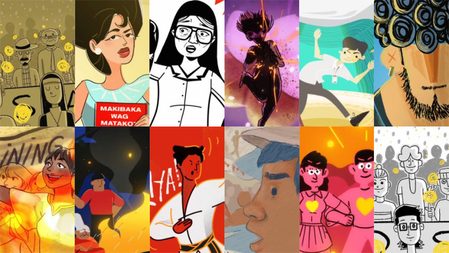

![[Newspoint] The lucky one](https://www.rappler.com/tachyon/2024/04/lucky-one-april-18-2024.jpg?resize=257%2C257&crop=536px%2C0px%2C1080px%2C1080px)
![[Just Saying] Marcos: A flat response, a missed opportunity](https://www.rappler.com/tachyon/2024/04/tl-marcos-flat-response-april-16-2024.jpg?resize=257%2C257&crop=277px%2C0px%2C720px%2C720px)
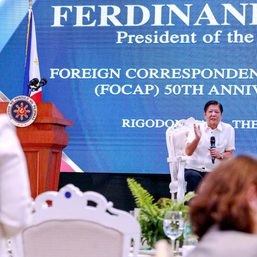
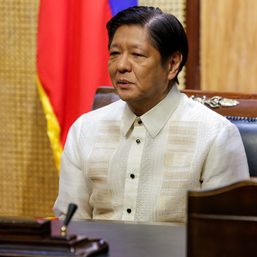
![[OPINION] If it’s Tuesday it must be Belgium – travels make over the Marcos image](https://www.rappler.com/tachyon/2024/04/tl-travel-makeovers-marcos-image.jpg?resize=257%2C257&crop_strategy=attention)
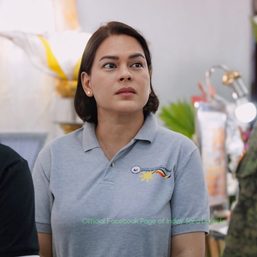
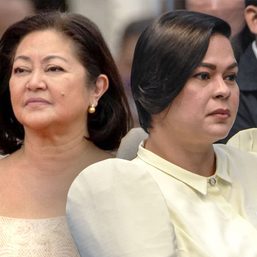
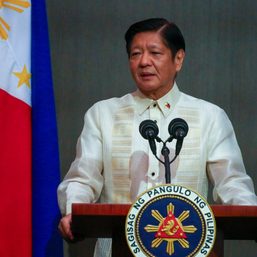
There are no comments yet. Add your comment to start the conversation.